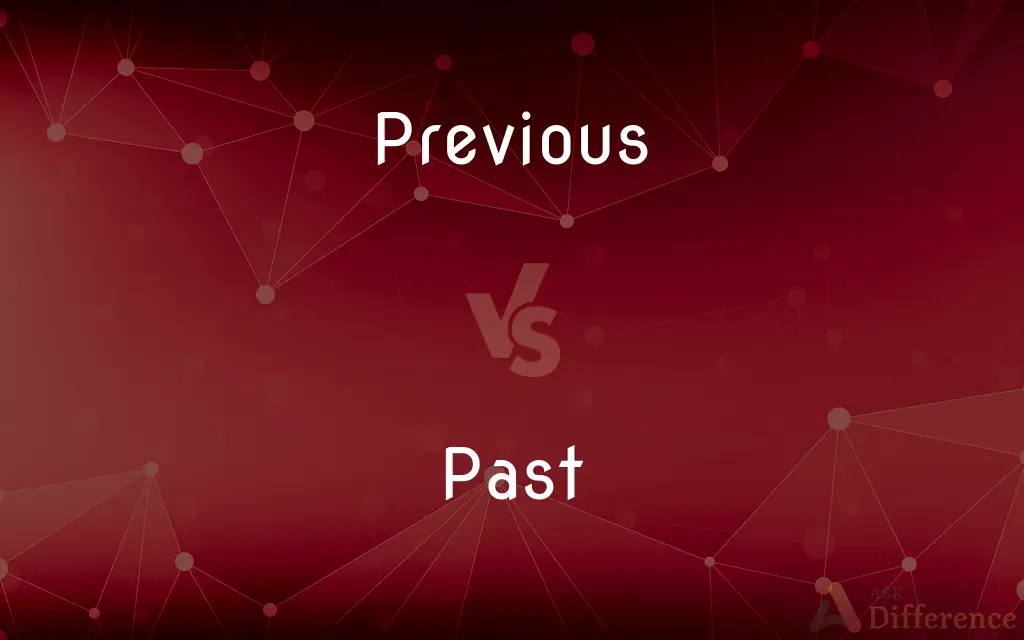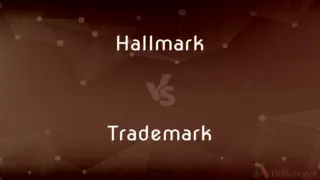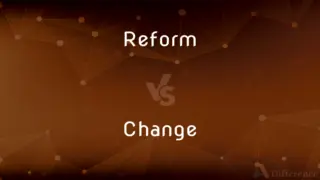Previous vs. Past — What's the Difference?
By Urooj Arif & Maham Liaqat — Updated on April 20, 2024
"Previous" refers to the one directly before the current in sequence, often implying immediacy; "past" denotes any time before now, encompassing a broader and less specific range.

Difference Between Previous and Past
Table of Contents
ADVERTISEMENT
Key Differences
"Previous" specifically identifies something that directly precedes another in order, such as the previous owner of a book or the previous year. This term often suggests a direct and immediate link to the current subject or time. On the other hand, "past" refers to any period or element that has occurred before the current moment, with no limitation on how far back it extends, such as historical events or childhood memories.
In contexts such as discussions of time, "previous" is typically used when referencing the directly preceding instance, such as "the previous week" when discussing a sequence of weekly events. Whereas, "past" can refer to any time before the present, often used more generally without specifying immediacy or sequence, such as "in the past few years."
When speaking about responsibility or ownership, "previous" implies the most recent holder or state before the current one, like "the previous administration." In contrast, "past" can imply multiple previous states or holders, as in "past administrations," which includes all former ones without focusing on the one directly before the current.
In narratives or recounts, "previous" is often used to connect directly related events or conditions, ensuring clarity in the sequence of occurrences. Meanwhile, "past" is used to set a backdrop or provide context that is not limited to the immediate predecessors but includes a wider range of historical or background conditions.
While "previous" is typically more constrained in its reference, focusing on the immediate predecessor, "past" allows for a broader and more flexible reference to any point before the present, useful for discussing history, experiences, or long-term changes.
ADVERTISEMENT
Comparison Chart
Definition
Directly preceding in time or order.
Any time before the current moment.
Specificity
High specificity, referring to the immediate prior.
Broad, encompassing any earlier time.
Common Usage
Used when discussing sequences or recent predecessors.
Used to refer generally to historical periods or ages.
Example Contexts
Last job position, the previous episode of a show.
Historical events, past relationships.
Temporal Range
Limited to the last occurrence or state.
Unlimited, extending indefinitely into history.
Compare with Definitions
Previous
Directly preceding in time or position.
She returned to her previous employer after a year away.
Past
Earlier in one’s life or history.
She spoke fondly of her past experiences.
Previous
Just earlier than the current.
In the previous chapter, the mystery begins to unfold.
Past
Former, generally referring to any earlier period.
His past achievements were recognized at the ceremony.
Previous
Immediately former.
The previous record was easily surpassed by the new champion.
Past
Historical, referring to an indefinite time before now.
The castle's past occupants are a mystery.
Previous
Last in a recent sequence.
His previous attempts had been unsuccessful.
Past
Any time that has already occurred.
In the past, travel was much more arduous.
Previous
Former, but directly before the current.
The previous owner had renovated the entire building.
Past
Before the present time.
Decisions made in the past shaped the current policy.
Previous
Existing or occurring before something else in time or order; prior
Children by a previous marriage.
Past
The past is the set of all events that occurred before a given point in time. The past is contrasted with and defined by the present and the future.
Previous
(Informal) Acting, occurring, or done too soon; premature or hasty
"I have been too previous, for which you must blame the natural impatience of a man in love" (Georgette Heyer).
Past
No longer current; gone by; over
His youth is past.
Previous
(not comparable) Prior; occurring before something else, either in time or order.
He is no better than the previous Prime Minister.
Past
Having existed or occurred in an earlier time; bygone
Past events.
In years past.
Previous
(informal) Premature; acting or occurring too soon.
Past
Earlier than the present time; ago
40 years past.
Previous
An existing criminal record (short for "previous convictions")
It turned out the shoplifter had a lot of previous.
Past
Just gone by or elapsed
In the past few days.
Previous
A track record of similar behaviour.
Past
Having served formerly in a given capacity, especially an official one
A past president.
A past inmate of a cell.
Previous
Going before in time; being or happening before something else; antecedent; prior; as, previous arrangements; a previous illness.
The dull sound . . . previous to the storm,Rolls o'er the muttering earth.
Past
(Grammar) Of, relating to, or being a verb tense or form used to express an action or condition prior to the time it is expressed.
Previous
(used especially of persons) of the immediate past;
The former president
Our late President is still very active
The previous occupant of the White House
Past
The time before the present.
Previous
Too soon or too hasty;
Our condemnation of him was a bit previous
A premature judgment
Past
Previous background, career, experiences, and activities
An elderly person with a distinguished past.
Previous
Just preceding something else in time or order;
The previous owner
My old house was larger
Past
A former period of someone's life kept secret or thought to be shameful
A family with a checkered past.
Past
The past tense.
Past
A verb form in the past tense.
Past
So as to pass by or go beyond
He waved as he walked past.
Past
Beyond in time; later than or after
Past midnight.
A quarter past two.
Past
Beyond in position; farther than
The house is a mile past the first stoplight. They walked past the memorial in silence.
Past
Beyond the power, scope, extent, or influence of
The problem is past the point of resolution.
Past
Beyond in development or appropriateness
The child is past drinking from a bottle. You're past sucking your thumb, so don't do it.
Past
Beyond the number or amount of
The child couldn't count past 20. See Usage Note at pass.
Past
The period of time that has already happened, in contrast to the present and the future.
A book about a time machine that can transport people back into the past
Past
(grammar) The past tense.
Past
Having already happened; in the past; finished.
Past glories
Past
(postmodifier) Following expressions of time to indicate how long ago something happened; ago.
Past
Of a period of time: having just gone by; previous.
During the past year
Past
(grammar) Of a tense, expressing action that has already happened or a previously-existing state.
Past tense
Past
In a direction that passes.
I watched him walk past
Past
Beyond in place or quantity
The room past mine
Count past twenty
What's the time? - It's now quarter past twelve midday (or 12.15pm).
Past
No longer capable of.
I'm past caring what he thinks of me.
Past
Having recovered or moved on from (a traumatic experience, etc.).
Past
Passing by, especially without stopping or being delayed.
Ignore them, we'll play past them.
Please don't drive past the fruit stand, I want to stop there.
Past
(obsolete) pass
Past
Of or pertaining to a former time or state; neither present nor future; gone by; elapsed; ended; spent; as, past troubles; past offences.
Past
A former time or state; a state of things gone by.
The present is only intelligible in the light of the past, often a very remote past indeed.
Past
Beyond, in position, or degree; further than; beyond the reach or influence of.
Until we be past thy borders.
Love, when once past government, is consequently past shame.
Past
Beyond, in time; after; as, past the hour.
Is it not past two o'clock?
Past
Above; exceeding; more than.
Not past three quarters of a mile.
Bows not past three quarters of a yard long.
Past
By; beyond; as, he ran past.
The alarum of drums swept past.
Past
The time that has elapsed;
Forget the past
Past
A earlier period in someone's life (especially one that they have reason to keep secret);
Reporters dug into the candidate's past
Past
A verb tense that expresses actions or states in the past
Past
Earlier than the present time; no longer current;
Time past
His youth is past
This past Thursday
The past year
The present leader
Articles for present use
The present topic
The present system
Present observations
Past
Of a person who has held and relinquished a position or office;
A retiring member of the board
Past
A verb tense or other construction referring to events or states that existed at some previous time;
Past participle
Past
So as to pass a given point;
Every hour a train goes past
Common Curiosities
How does "previous" enhance clarity in communication?
"Previous" enhances clarity by specifying the direct link to the current subject or time, avoiding ambiguity.
What are examples of "previous" used in a practical context?
Examples include discussing the previous owner of a car or the previous episode in a TV series.
What is the main difference between previous and past?
"Previous" refers to the direct predecessor, while "past" covers any time before now, regardless of immediacy.
Can "previous" and "past" be used interchangeably?
While sometimes used interchangeably in casual conversation, "previous" is more specific, and "past" is broader and less defined.
Does "past" carry emotional weight in its usage?
"Past" can carry emotional weight, especially when discussing personal histories or significant historical events.
Can "past" refer to general experiences as well as specific times?
Yes, "past" can refer to experiences and events broadly, such as someone's past life experiences.
How do textbooks use "previous" and "past"?
Textbooks use "previous" to refer to recently discussed concepts or chapters, while "past" may be used to describe historical contexts or timelines.
How do narratives benefit from using "previous"?
In narratives, "previous" helps maintain a clear and logical sequence of events or arguments.
What is the significance of "past" in cultural discussions?
"Past" is significant in cultural discussions as it encompasses a wide range of historical periods and influences.
Can "previous" imply any emotional connotations?
"Previous" is usually neutral, focusing on factual sequence rather than emotional content.
What is the temporal range difference between "previous" and "past"?
"Previous" is limited to the last occurrence, while "past" is indefinite and can refer to any time up to the present.
Why might someone choose to use "past" instead of "previous"?
"Past" is used when referring to a broader historical context or when the exact sequence is not critical.
What should one consider when choosing between "previous" and "past"?
Consider whether the reference needs to specify the direct predecessor or can encompass a broader, more indefinite time frame.
How does "past" relate to historical discussions?
"Past" is often used to discuss history in a broad sense, such as referring to past centuries or historical trends.
Is "previous" limited to discussions of time?
No, "previous" can also refer to order in space or sequence, like in a list or a queue.
Share Your Discovery

Previous Comparison
Hallmark vs. Trademark
Next Comparison
Reform vs. ChangeAuthor Spotlight
Written by
Urooj ArifUrooj is a skilled content writer at Ask Difference, known for her exceptional ability to simplify complex topics into engaging and informative content. With a passion for research and a flair for clear, concise writing, she consistently delivers articles that resonate with our diverse audience.
Co-written by
Maham Liaqat















































